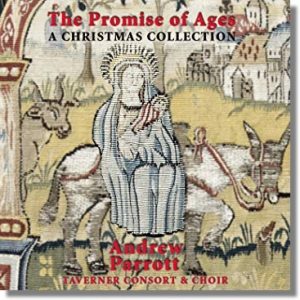On Christmas Eve in our parish, we heard a sermon about the mystery of the Incarnation. God loves flesh; how surprising is that?? His love for us is not an abstraction, but a Person born of a woman.
The text to the fourteenth-century poem A spotless rose (discussed yesterday) compares Jesus to a rose from the root of Jesse. This situates the Messiah in human history, with all its fleshly particularity and vulnerability. Meanwhile, another medieval poem that has often been set to music — There is no rose — uses the imagery of the rose to describe the Virgin Mary, her body wondrously transcending the usual configuration of space and time:
For in this rose containèd was
Heaven and earth in little space.

This poem — accompanied by a simple musical score — is one of the gems contained on a discolored and partially decayed manuscript roll from the fifteenth century in the library of Trinity College, Cambridge (the carol’s origins are often thus cited as Trinity Roll). It is one of the songs on a recording issued in 1998 from the Taverner Consort & Choir, conducted by Andrew Parrott. To be more precise, The Promise of Ages: A Christmas Collection actually features only the women who sing in Parrott’s ensemble, joined by female members of the New London Chamber Choir and the Henrietta Barnett School Choir. This feminine presence reflects not that this music is just about Mary, but that it is about Mary and the amazing things she experienced. It encourages us to view the Nativity from her point of view, not just from our own vantage point, let alone from some detached and distant “wide shot.”
The mystery of “Heaven and earth in little space” is a theme that hovers over all of this album’s selections. In the Song of the Nuns of Chester (dating from the thirteenth or fourteenth century), the first verse proclaims:
He who created the sky
Is born in a stable,
The King who rules the age.
The fourth verse accentuates the meeting of Heaven and earth even more graphically:
The Mother of the Lord gives milk,
She kisses the Infant,
And worships the Lord.
As is the case with many of the most compelling recordings of Christmas music, Andrew Parrott has programmed a number of late medieval settings alongside modern settings of the same text. So he follows that Trinity Roll arrangement of There is no rose with one from Benjamin Britten’s A Ceremony of Carols, written in 1942, Here is the medieval setting:
Here is the setting of the same text from Britten’s A Ceremony of Carols:
The only exceptions to this counterpoising of medieval and modern settings occur — like bookends — at the beginning and end of the album (don’t leave your device on shuffle, or you’ll miss the point of this collection). Parrott has chosen two rousing late eighteenth-century carols, both rendered with robust enthusiasm. The closing piece is the familiar melody and text of Lo! He comes, with clouds descending, sung about twice as fast as we normally sing it. And launching the collection is a rousing arrangement of Hark the herald angels sing, arranged (most likely) by Charles Burney (1726-1814).
The Promise of Ages: A Christmas Collection, with the Taverner Consort & Choir, conducted by Andrew Parrott, is hard to find on CD, but is available in digital format from Amazon, iTunes, and other digital sources, minus, I’m sorry to say, the informative booklet that accompanied the CD. The texts and historical notes in that booklet help to situate the music in space and time; this music is not just an occasion of beautiful sound, but— like the Messiah and his mother — is part of a meaningful, intelligible, and wonderful history.